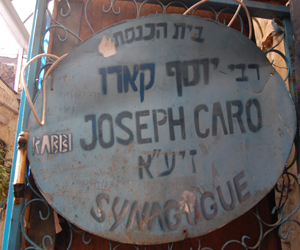 Rabbi Joseph Caro (1488-1575) was one of the most influential rabbis in Jewish history. He was the compiler of the Shulkhan Arukh, the best known code of Jewish law, and other distinguished books of rabbinic interpretation.
Rabbi Joseph Caro (1488-1575) was one of the most influential rabbis in Jewish history. He was the compiler of the Shulkhan Arukh, the best known code of Jewish law, and other distinguished books of rabbinic interpretation.Caro was also a kabbalist, a mystic who received intruction from his own personal muse, or maggid, as it was called in the rabbinic tradition. We currently are studying his mystical diary and commentary, published in part as the Maggid Mesharim. A standard edition is available at HebrewBooks.org (three editions, here, here and here), and a scanned Hebrew-Aramaic text is online at an amazing Czech mystical text site and on wikitext.
Since studying with a mystical maggid is not a usual mode of rabbinic learning, in 1949 several scholars and doctors put out a book discussing Caro and his mental state, "The Maggid of Caro: The Mystic Life of the Eminent Codifier Joseph Caro as Revealed in His Secret Diary" edited by Hirsch Loeb Gordon.
Thinking about Caro made us focus in on rabbinic ordination, a mechanism that Caro wanted to revise. What we call "semicha", i.e. the ordaining of rabbis, is not really "semicha", i.e. the laying on of hands in the full-fledged transfer of charismatic powers. Our ordinations are certificates, diplomas of education achievement. Most such diplomas certify that the "rabbi" bearing the certificate studied the laws of "the prohibited and the permitted". Based on that "pseudo-semicha" certifying educational accomplishment, rabbis exert a claim to communal leadership. Real semicha ceased to be given, some say in the fourth century CE due to Roman prohibition of the act of Jews arrogating authority.
All rabbis since that time have received at most a "pseudo-semicha."
Together with Rabbi Jacob Berab of Safed, Caro wanted to restore actual "semicha" as a religious ceremony investing a rabbi with formal authority. Berab and Caro and a few others claimed to have revived the ancient formal semicha. But other rabbis of the time objected and the project failed (see for example the last 100 pages of Levi ibn Habib's responsa volume, known as his notebook on semicha).
Today in Israel, rather than building up the eminence of ordination, many rabbis appear to be bent on eroding the authority of semicha once again. It's a problem. Discuss.
No comments:
Post a Comment